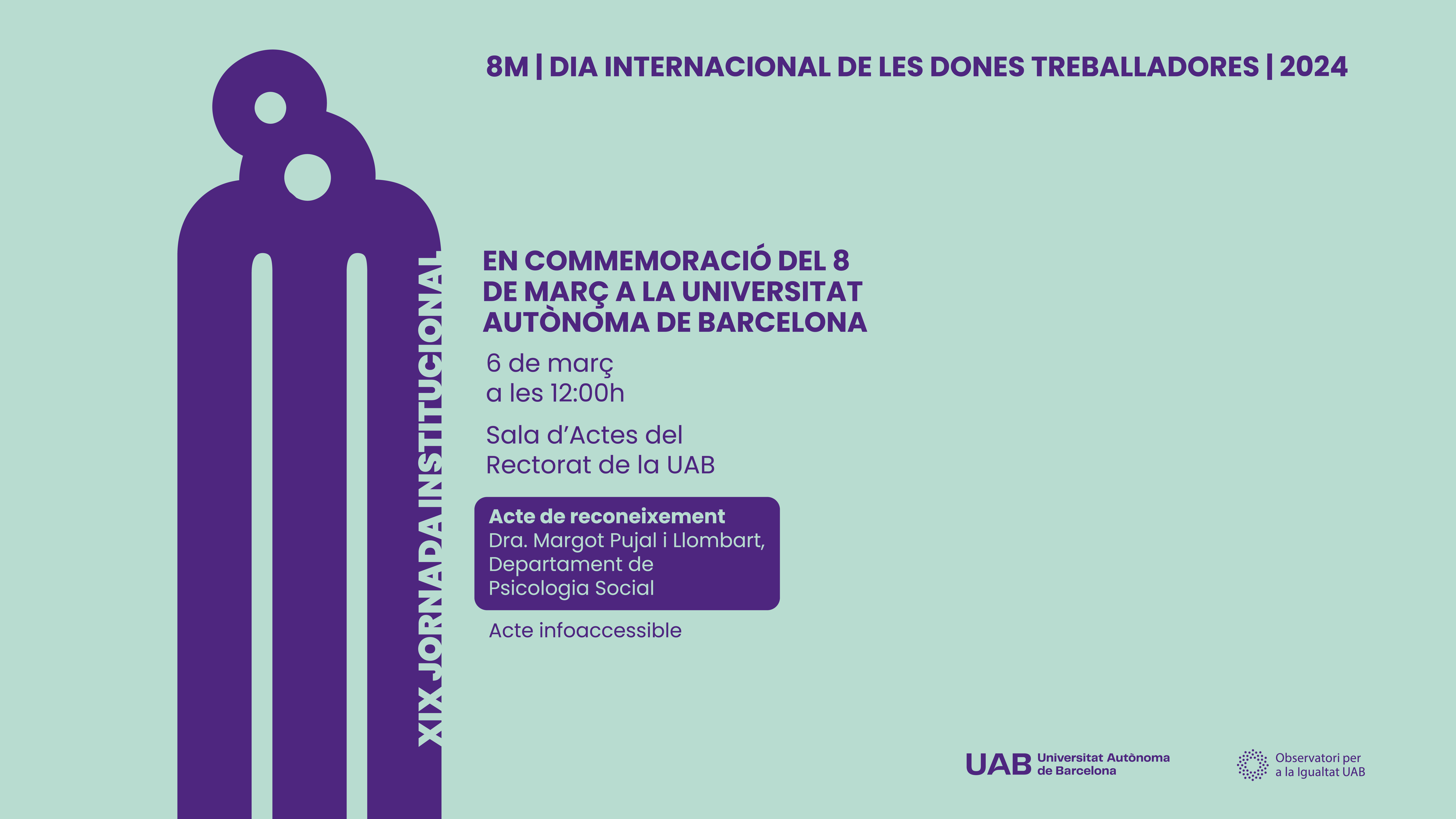The UAB commemorates this day on March 6th at 12pm in the ceremony hall at the Rector’s office. This year, the act will acknowledge the career of the Dr. Margot Pujal i Llombart of the Social Psychology Department. The act is infoaccesible.

On March 6th at 12pm, the UAB commemorates the International Women’s Day with the 7th Institutional Day in the conference room at the Rectorate. This year’s act acknowledges the career of compromise with gender equality of the Dr. Margot Pujal i Llombart from the Social Psychology Department. Moreover, the Chamber Choir of the UAB performs. This act is info accessible with an interpreter of sign language and subtitles.
The course starts with an opening from the general secretary, Esther Zapater. The director from the Observatory for Equality, Maria Prats, will present the main results to the diagnosis for the elaboration of the 5th Action Plan for Gender Equality. Then, the act of acknowledgement to the Dr. Margot Pujal i Llombart will start. Finally, the Chamber Choir will perform and the rector, Javier Lafuente, will close the act.
Margot Pujal i Llombart, doctor from the Psychology’s Department of the UAB, has focused her research on social psychology and gender studies. Nowadays, it is part of the DES-Subjectant.GESPI group, concentrating on the socials and about the body, subjectivity and suffering. She has also been the coordinator of the Joan Rivière Centre of Psychology and gender. In her latest articles matters like the colonial gender system, the stigma, prostitution, the non-binarise of gender-based violences.
- The Servei d’Activitat Física (SAF) organises different sportive activities of free registration for women of the UAB community, as the Champions League. These activities settle down on the course «Dones ens movem», expected between February 15th and May 21h 2024, boosted for contributing to the UAB compromise with gender policies.
- The workshop «Dones i Enginyeria», boosted for the School of Engineering of the UAB, takes place on March 15th from 9am to 3pm in the proper building. Furthermore, to boost feminine talent, it is expected to have a training course for creating a persona brand and use social media with feminine perspective. It is required previous registration.
- The Faculty of Economics commemorates Women’s Day with a speech of the course“Emprenedoria en femení” on March 13th from 1pm to 2.30pm (in the ceremony hall at the building. The talk counts on with the vice rector, Rosi Sebastián and the chairwoman, Judith Penedès, from the faculty: as Glòria Infiesta, financial adviser in Denarius Advisory, Berta Madueño, co-founder in Tattox, and Berta Pons, co- founder of aborda Dos.
- The group Dones i Dret de la UAB organises the journey «Mirades des de la recerca» on May 7th from 10.30am to 1.30pm in the Aula Magna of the Faculty of Law. The conference has some talks in different settles of law, from artificial intelligence in communications, to gender perspective. The modeller is Olga Paz Torres.
- The Institute of Neuroscience and the Faculty of Medicine organises International Women’s Day conference entitled «Donem visibilitat a la dona en l’àmbit de la salut» on March 7th from 1pm to 3pm in classroom M5-001. The conference features four talks by experts in health with gender perspective. Otherwise, in the Library of Medicine there will take place two expositions «Dones que ens inspiren a la Medicina» i «Medicina en perspectiva de gènere». Also, in the hall of the same faculty, it is organised a participation activity entitled «Expressa’t: I tu, com ho veus i què li demanes al 8M? » from March 4th to 8th.
- Cultura en Viu and the Faculty of Sciences for Education recover the legacy of women teachers of the Second Republic with a play, «La primera i les mestres de la república», on March 5th at 1pm in the play hall of the UAB.- Cultura en Viu and the Faculty of Sciences for Education recover the legacy of women teachers of the Second Republic with a play, «La primera i les mestres de la república», on March 5th at 1pm in the play hall of the UAB.
- The Faculty of Psychology expects a seminar of personal feminine defence March6th from 4pm to 8pm in the SAF sports centre
From the Observatory for Equality, with funding from the Board of Trustees, it has been launched the campaign #Lasapsreconèixer, to learn how to identify sexist violences in one minute.
The UAB, through the Observatory for Equality, adheres to the manifest of the Dones i Ciència Commission from the Inter-university Council of Catalonia. Meanwhile, it also joins the document of the Network of Gender Equality Unities for University Excellence (RUIGEU for its acronym in Spanish).
Gender stereotypes remain in the 21st century. Women keep getting lower wages, assuming a greater care burden and unpaid domestic tasks, and being underrepresented in leadership positions, among other inequalities.
According to the United Nations Development Program (PNUD), the gender inequality index (GII) in the world stood at 0.958 in 2022, while in Spain it stood at 0.986. If this number were 1, we would be talking about total equality. In contrast, a value of 0 would mean absolute inequality.
The GII is a composite measure that quantifies the distance that a society finds from being completely egalitarian in three basic dimensions of development: health, education and economical resources. According to this measure, Spain is located above the global average, being on 18th position globally.
In Catalonia, we also have a similar composite metric, a scale from 0 to 100.According to the information of the Catalan Institute for Women, the GII was in 74,1. Unlike the PNUD index, the Catalan one takes as reference the methodology from the European Institute for Gender Equality (EIGEA), that takes into account more dimensions: knowledge, work, power, and money and health. These dimensions are subdivided in 31 different indicators.